 Tel:
+8618931101301
Tel:
+8618931101301
נוב . 06, 2024 03:25 Back to list
Optimal Performance of Cartridge Filters for Air Purification Systems
Understanding Cartridge Filter Air A Comprehensive Overview
In the world of filtration systems, cartridge filters have gained a prominent place, especially in air purification applications. Their effectiveness, compact design, and ease of use make them a preferred choice for various industries, including commercial, residential, and industrial settings. This article delves into the workings, benefits, types, and applications of cartridge filter air systems.
What is a Cartridge Filter Air System?
A cartridge filter air system employs a cylindrical or tubular-shaped filter element that is housed within a filtration unit. The primary function of this system is to remove particulates, dust, pollen, and other contaminants from the air. Unlike traditional filters, which may require more space and maintenance, cartridge filters are designed for efficiency and convenience.
The filter cartridges are often made from materials like pleated polyester, spun fiberglass, or cellulose. This construction increases the surface area available for trapping particles, thus enhancing filtering capacity and effectiveness. Additionally, most cartridge filters are designed to be disposable, making them easy to replace when they reach their capacity or become clogged.
How Do Cartridge Filters Work?
Cartridge filters operate on a straightforward principle of air passage through a porous material. When contaminated air enters the filtration unit, it flows through the filter cartridge. The particulate matter is trapped within the fibers, allowing cleaner, purified air to flow out. The filtration efficiency can vary depending on several factors, including the filter material, the flow rate of the air, and the size of the particles being filtered.
One of the key metrics used to gauge the performance of cartridge filters is the Minimum Efficiency Reporting Value (MERV). This rating quantifies a filter’s efficiency in capturing particles of different sizes. A higher MERV rating indicates better filtration capability, ensuring that smaller and more harmful contaminants are effectively removed.
Benefits of Cartridge Filter Air Systems
1. Space-Efficiency Cartridge filters are compact and can fit into tight spaces, making them suitable for various applications where space constraints are a concern.
2. Easy Maintenance The design of cartridge filters allows for quick replacements. Many systems are also equipped with differential pressure gauges that signify when a filter change is necessary.
3. Cost-Effective With proper maintenance and timely replacement, cartridge filters can be a cost-effective solution in the long run. They help improve air quality, which can lead to fewer health issues for occupants and less wear on HVAC systems.
4. Versatility These filters can be used in a broad range of environments, including industrial facilities, commercial buildings, and even home HVAC systems.
cartridge filter air

5. Enhanced Air Quality By efficiently trapping harmful particles, cartridge filter air systems significantly enhance indoor air quality, contributing to a healthier living and working environment.
Types of Cartridge Filters
There are several types of cartridge filters designed for specific applications in air filtration
- Pleated Filters These provide an extensive surface area for air filtration and are commonly used in HVAC systems. - HEPA Filters High-Efficiency Particulate Air filters capture a high percentage of very small particles, making them ideal for environments that require the highest levels of cleanliness, such as hospitals and laboratories.
- Electrostatic Filters By utilizing an electric charge, these filters attract particles, improving efficiency in capturing dust and allergens.
- Activated Carbon Filters These filters are effective in removing odors and harmful gases by adsorbing various volatile organic compounds (VOCs).
Applications of Cartridge Filter Air Systems
Cartridge filters are employed in a variety of settings due to their versatility. Common applications include
- Residential HVAC Systems Improving indoor air quality in homes by filtering pollen, dust, and pet dander.
- Industrial Dust Collection Capturing airborne dust and particulate matter in manufacturing and processing plants.
- Commercial Buildings Ensuring clean air in offices and public spaces to promote health and comfort.
- Pharmeceuticals and Healthcare Facilities Providing the highest level of air purity needed for sensitive operations and environments.
In summary, cartridge filter air systems play a crucial role in enhancing air quality across various applications. Their efficient design, ease of maintenance, and ability to effectively trap contaminants make them invaluable in today’s air filtration landscape. As concerns about indoor air quality continue to rise, the relevance of cartridge filters will undoubtedly grow, serving as a pivotal solution to create healthier environments.
-
The truth about washable filters: Does repeated use really not affect efficiency?NewsJun.25,2025
-
Effect of humidity on the performance of activated carbon filter elementsNewsJun.24,2025
-
Material selection considerations for dust removal filter elements under high temperature conditionsNewsJun.23,2025
-
Cold knowledge of air filters: Why are some designed to be pleated?NewsJun.16,2025
-
Factory direct supply! High-precision air filter element wholesale and customizationNewsJun.12,2025
-
A complete analysis of the practical value of activated carbon filtersNewsJun.10,2025

 Email:
Email:





